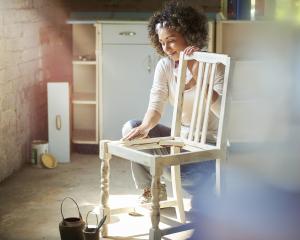There's a lot of mental energy involved in maintaining our stuff, life coach Jan Aitken says.

We live in a culture that tends to send the message that acquiring things is good, it's what we should do, that we need more and more stuff in our lives.
Probably most of us have more stuff than we really need.
That's OK, up to a point, but when we start to spend money we need for other more important items or get our new purchase home and have nowhere to put it, well, then it might be time to take stock and have a think about what's going on.
It may also be time to have a clear out, a de-clutter session.
EFFECTS OF CLUTTER
Even small amounts of clutter can impede our lives. There's a lot of mental energy involved in maintaining our stuff. Small items need small amounts of care, but it all adds up.
A house needs upkeep. You have to dust your books and ornaments, you have to vacuum. Maybe you need to shift piles of papers to sit down at the dining table or on the lounge suite.
Simply, the more you have, the more energy it takes from your relationships, your emotional life, your downtime and even your work.
Having too much stuff can put you in danger. An Australian study found that hoarding accounted for 24% of fire fatalities over a period of 10 years.
Hoarding has been linked to respiratory illness and injuries from falls and fire.
The emotional toll is great as well. When stuff overruns the home, you can start to feel isolated, too embarrassed to open the space to relatives or entertain friends. The more things accumulate, the harder it is to get anything done.
There are links between physical clutter and head clutter.
Clutter, depression and anxiety seem to go hand in hand.
Now, I'm not advocating a completely minimalist approach to life, heck no! I'd miss my Peanuts collection books, CDs and the mugs my aunt gave me for my 21st birthday too much!
Somewhere there's a balance between having things in our home and being overwhelmed by what we have. That balance will be different for all of us.
WHY DO WE BUY STUFF?
There are lots of reasons we buy. Our brains were wired to acquire, especially food and shelter back in the days when they were scarce commodities.
Nowadays for many of us in the Western world food and shelter are more easily taken care of, so we have switched our focus to acquiring other things.
Buying can comfort us, we reward ourselves with shopping, we buy to impress others, to feel secure, because we actually need certain things.
We buy because we're motivated by fear.
Fear we'll miss out on the latest trend, fear we won't fit in, fear we won't have the same cool things our friends have.
Marketers and advertisers know our fears well and play on them to encourage us to buy.
''Limited offer'', ''Last big sale of the year'', ''Specials'', ''up to 50% off'' (usually very little is actually 50% off!), ''exclusive'', ''last of this model'' etc.
We're conditioned to respond by buying.
WHY DO WE KEEP STUFF?
There are lots of reasons we keep stuff!
It makes us feel successful and secure, we feel guilty ridding ourselves of something someone has given us: they'll think I don't like them!
We keep stuff through fear: what if I need it; what if I run out of whatever it is and can't get more; it might be worth something one day; I spent a lot of money on it I can't get rid of it!; I might use it I'll keep it just in case.
TOP TIPS FOR DE-CLUTTERING
So, you've decided it's time to clear a few things out. Be aware even when you decide to de-clutter, it can still be a tough and quite emotional task.
Some good questions to ask yourself, to help you decide whether to keep something or not are:
• Do I use it, or have I used it in the last year?
• Do I really, really love it
• Would I buy it again?
With those questions in mind take a room by room approach. For each room have a ''put back box'' a ''give away box'' an ''other room box'' a ''rubbish bag'' and a ''recycle bag''
First: if items belong in the room you're in but are out of place put them in the ''put back box'' e.g. clothes on the floor of the bedroom.
Second: items you don't use or haven't used in a year, don't love or wouldn't buy again can be given away (local charities, op shops etc) so into the ''give away box'' they go. It's great that someone else can get some use or joy out of the stuff you don't want anymore.
Third: if an item doesn't belong in the room you're working in put it in the ''other room box''. These items can be put in the rooms they should be in later.
Anything left over that can't be recycled goes in the rubbish box.
It might be more fun to do this with someone else, the music turned up and a timer on for 20-30 minutes, then take a short break and get back into it.
You may want to do only one room a week or two rooms a weekend. Find out what works for you.
When you are tempted to buy something and bring it home, take a moment to think about the following:
• Do I have the space to put it somewhere?
• How often will I really use it?
• Do I really, really love it?
• Am I buying it to make me feel better?
If so, then there's probably other emotional or personal needs that need to be met. It might be worth working on those.
Keep the wonderful, special things around you. Remember, it's about having the things that are important to you.
The things you no longer use, love or need can bring joy to others.
• Jan Aitken is a Dunedin-based life coach.
For more go to www.fitforlifecoaches.co.nz.
Twitter:@jan-aitken












